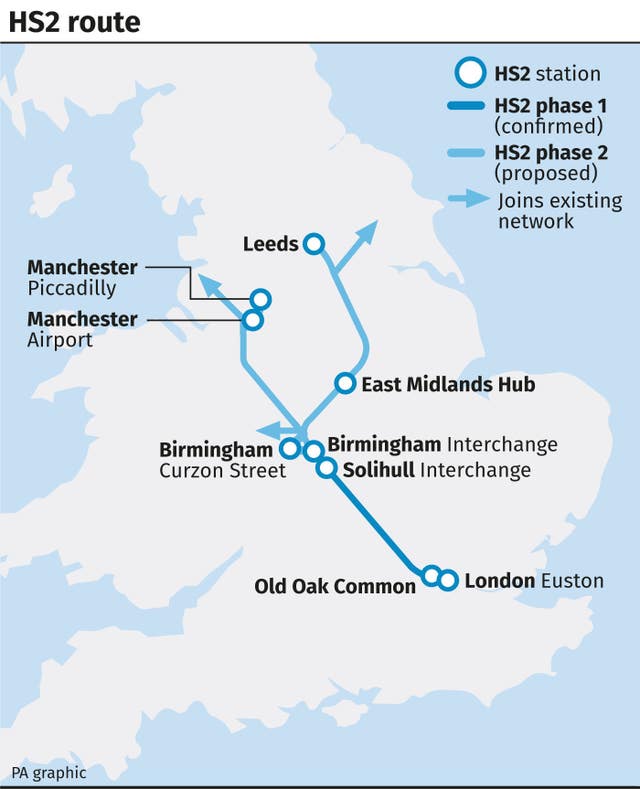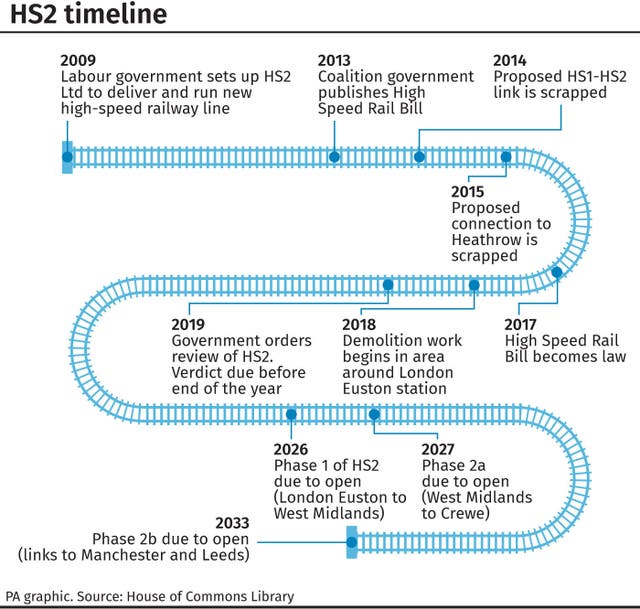
A Government-commissioned independent review into HS2 will analyse whether and how the project should continue, the Department for Transport (DfT) has announced.
Former HS2 Ltd chairman Douglas Oakervee will lead the inquiry, with Lord Berkeley – a long-term critic of the high-speed railway scheme – acting as his deputy.
The DfT said the review will consider a number of factors relating to HS2, including its benefits, impacts, affordability, efficiency, deliverability, scope and phasing.

A final report will be sent to Transport Secretary Grant Shapps – with oversight from Prime Minister Boris Johnson and Chancellor Sajid Javid – by the autumn.
This will “inform the Government’s decisions on next steps for the project”, according to the DfT.
The launch of the review comes amid growing concern that HS2 cannot be built to its current specification within the £55.7 billion budget.
Mr Shapps said: “The Prime Minister has been clear that transport infrastructure has the potential to drive economic growth, redistribute opportunity and support towns and cities across the UK, but that investments must be subject to continuous assessment of their costs and benefits.
“That’s why we are undertaking this independent and rigorous review of HS2.
“Douglas Oakervee and his expert panel will consider all the evidence available, and provide the department with clear advice on the future of the project.”
THREAD: HS2 review is about as stupid as you can get & screws Birmingham & the North. Classic Johnson. It throws project into flux & will cause big delays, loss of confidence & cost increases. But HS2 will almost certainly continue afterwards in modified form. What a shambles
— Andrew Adonis (@Andrew_Adonis) August 21, 2019
Mr Oakervee said: “The Prime Minister has asked me to lead this important review into the HS2 programme.
“I am looking forward to working with my deputy, Lord Berkeley, to advise the Government on how and whether to progress with HS2, based on all existing evidence.”
The review’s terms of reference state that it will consider how much “realistic potential” there is for cost reductions by amending the scope of the project, such as:
– Reducing the speed of the trains;
– Making Old Oak Common the London terminus “at least for a period”, instead of Euston;
– Building only Phase 1, between London and Birmingham;
– Combining Phase 2a – extending the line to Crewe – with Phase 1;
– Altering plans for Phase 2b, which currently involves taking the line to Manchester and Leeds.
The DfT said limited, largely preparatory work on the project will continue in parallel with the review.
Transport Minister Baroness Vere told the House of Lords last month that £7.4 billion has already been spent on HS2.
The figure includes money towards the purchase of land and property, ground investigation work, technical designs, IT systems, wages and public engagement.

A recent Financial Times report stated that HS2 Ltd chairman Allan Cook wrote to the DfT warning the final bill could reach as much as £85 billion.
The feared price hike is believed to be due to various factors including engineering costs, poor ground conditions, under-estimating the cost to purchase land and property, and the expense of running trains at up to 225mph, which is faster than comparable projects.
A report by the House of Lords Economic Affairs Committee published in May warned it is “far from convinced” that HS2 will be built within its budget.
The committee stated the cost of the project could be cut by reducing the speed of the trains and moving the London terminus.
It claimed construction of HS2 should have started in the North rather than the South, adding that the Northern Powerhouse Rail scheme connecting major towns and cities in the region should be completed alongside the high-speed railway.
Former Labour transport secretary Lord Adonis claimed the review was “about as stupid as you can get” as it “screws Birmingham and the North”.
Writing on Twitter, he added: “Classic Johnson. It throws project into flux and will cause big delays, loss of confidence and cost increases. But HS2 will almost certainly continue afterwards in modified form. What a shambles.”
A YouGov survey of 2,779 Britons carried out in May indicated that 40% of people oppose the building of a high-speed rail line along the route planned for HS2, with 32% in support.
Nearly half (49%) of Conservative voters polled said they were against such a scheme.


Comments: Our rules
We want our comments to be a lively and valuable part of our community - a place where readers can debate and engage with the most important local issues. The ability to comment on our stories is a privilege, not a right, however, and that privilege may be withdrawn if it is abused or misused.
Please report any comments that break our rules.
Read the rules here